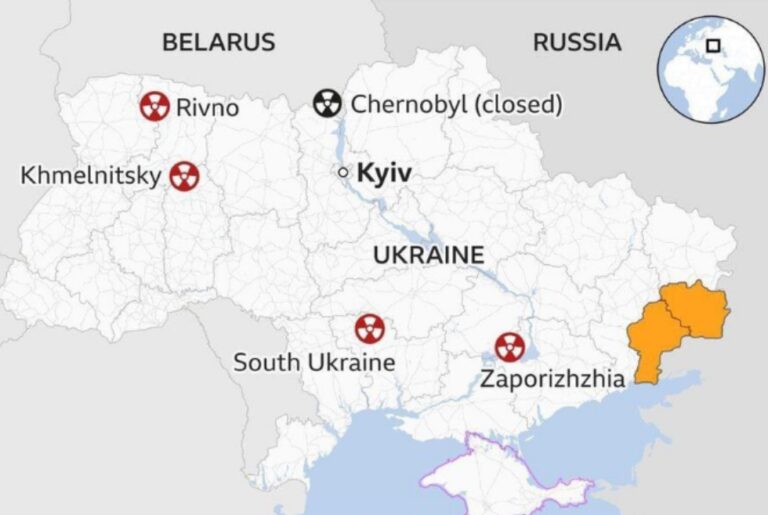While an exchange of accusations has been going on for days between Ukraine and Russia over possible imminent attacks on the Zaporizhzhia nuclear power plant, the director of the International Atomic Energy Agency (IEAA) reassures that the experts sent to the site ‘have found no mines or other explosives’, arousing irritation in Kyiv.
But what is the real situation and what would be the risks if the Ukrainian nuclear power plant in Zaporizhzhia were to explode?
Table of Contents
The exchange of accusations between Ukraine and Russia
Since the outbreak of war on 24 February 2022, Russia and Ukraine have regularly accused each other of jeopardising the safety of the Zaporizhzhia nuclear power plant, which has been occupied since early March 2022 by the Russians. The plant is the largest in the country and in Europe and the fifth largest in the world.
In recent days, tensions have risen even higher because President Volodymyr Zelensky, quoting Ukrainian intelligence, said that Russia was ‘preparing a provocation’ at the plant, on the roof of which explosives had allegedly been placed. The secret services also claim that Russian employees working at the plant have been told to leave the area by 5 July.
Differences and similarities with Chernobyl and Fukushima
Physicist Luca Romano, nuclear expert explained on Twitter what the current situation inside the Zaporizhzhia power plant is and what the risks are of a possible accident, starting from facts and data relating to the Chernobyl and Fukushima disasters.
Based on this information, Romano explains what the situation at Zaporizhzhia is and why ‘the risks to human health would be very close to statistical zero‘.
“So what are we talking about?” the physicist questions. For Romano it is very ‘simple’ and he explains the ‘pantomime’ in this way:
The real and ‘very serious’ problem, on the other hand, for the expert are ‘the psychological consequences of the accidents’ because ‘both in the case of Chernobyl and Fukushima panic and social stigma caused many more deaths than radiation.
Read also: Russia, ‘nuclear apocalypse quite likely’: how Medvedev threatens the world
Why Russia would not want to cause an accident
Russia, however, while continuing to nurture atomic anxiety, would have no good reason to go all the way.
Because, as the manifesto notes, ‘the winds can carry it [the radiation, ed.] to the west (towards the countries of the European Union), but also to the east, towards Russia itself’. And ‘it would therefore make no sense for the Russians to sabotage the largest nuclear plant in Europe, built by the USSR between 1980 and 1996’.
In addition, ‘an accident would have very heavy economic repercussions on the Russian nuclear industry itself, which to date has contracts worth around 250 billion dollars’.
Read also: Russia deploys ‘non-strategic’ nuclear weapons to Belarus: what are they












